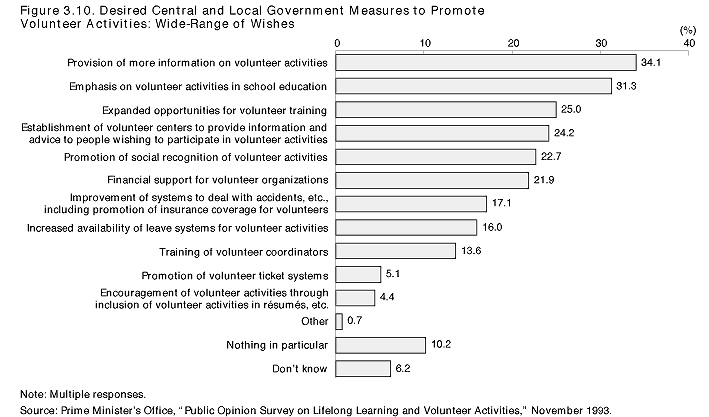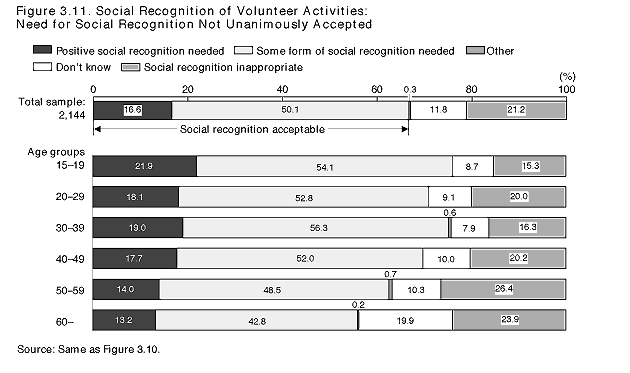| Home > Policy > White Paper, Notice, Announcement > White Paper > JAPANESE GOVERNMENT POLICIES IN EDUCATION, SCIENCE, SPORTS AND CULTURE 1996 > Priorities and Prospects for a Lifelong Learning Society Chapter 3 Section 4 2 | ||
As discussed in chapter 2, the results of the 1993 "Public Opinion Survey on Lifelong Learning and Volunteer Activities" show that a significant number of people indicated interest in volunteer activities as a way of using experience, knowledge, and skills gained through learning activities to help others, to contribute to community activities, or to provide others with guidance in learning, sports, and cultural activities.
Volunteer activities are extremely significant as a way of utilizing knowledge and skills gained through learning activities. Thus it is necessary to provide increased support and encouragement for volunteer activities. Yet despite increased interest in volunteer activities following the Great Hanshin-Awaji Earthquake, this interest has not always led to actual participation (see chapter 2 ).
Participants in the above-mentioned survey were asked to state the steps they would like to see central and local governments take to promote volunteer activities. There were varied responses, including "provision of more information on volunteer activities" (34.1%), "emphasis on volunteer activities in school education" (31.3%), "expanded opportunities for volunteer training" (25.0%), "establishment of volunteer centers to provide information and advice to people wishing to participate in volunteer activities" (24.2%), "promotion of social recognition of volunteer activities" (22.7%), and "financial support for volunteer organizations" (21.9%) ( Figure 3.10 ).
These results suggest that expectations of government support for volunteer activities vary widely. Some people want the public sector to raise general awareness of volunteer activities, while others want it to provide information, training, evaluation, and support to organizations. In addition, there is increasing discussion of the use of legal mechanisms to provide support to citizen groups involved in volunteer activities, such as the granting of corporate status to nonprofit organizations.
The public sector needs to play a constructive role in efforts to create an environment conducive to public participation in volunteer activities. Examples of areas in which the public sector could help include development of venues for activities, as by encouraging greater acceptance of volunteers in lifelong learning facilities, training of volunteer coordinators, establishment of information access systems, and support for volunteer groups.
Almost 67% of participants in the survey said they thought there should be either "positive social recognition" or "some form of social recognition," while 21.2% thought social recognition was "inappropriate" ( Figure 3.11 ). The main reasons given for the third view were that "the personal fulfillment and satisfaction provided by volunteer activities is sufficient reward; it should not be necessary to seek the approval of others or the community" and that "by nature volunteer activities are performed gratis, not in expectation of payment." The divergence of opinion on recognition thus relates to core characteristics of volunteer activities. To provide increased support for volunteer activities and encourage their growth, it is necessary to consider various approaches to recognition. When the central and local governments implement measures to promote volunteer activities, it is important to achieve harmony with the basic ideals of volunteer activities, including the fact that such activities are carried out voluntarily, without payment, and for the sake of the public interest.


| Back to Top | MEXT HOME |